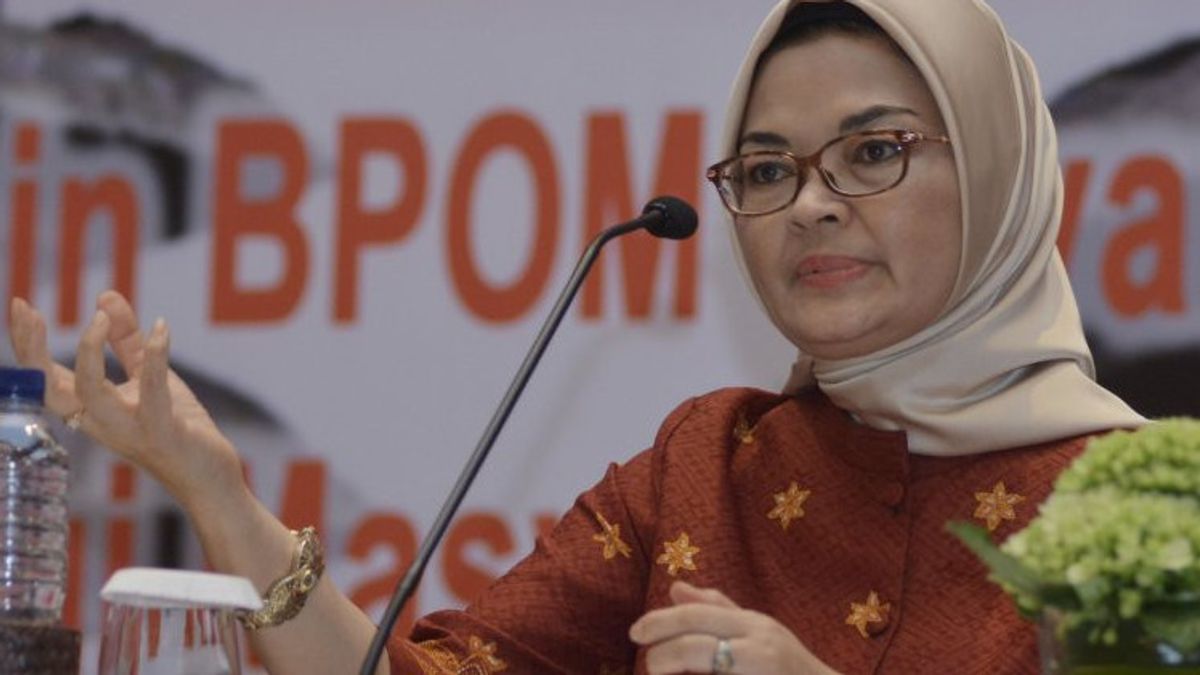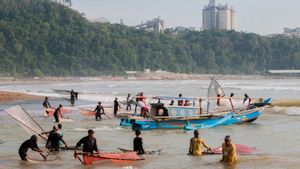JAKARTA - In line with the mandate of Law Number 18 of 2012 concerning Food, the POM Agency is given the authority to supervise the fulfillment of safety, quality, nutrition and labeling requirements as well as advertisements for processed food.
Presidential Regulation No. 80 of 2017 concerning the POM Agency, it is stated that the POM Agency carries out the function of compiling and establishing norms, standards, procedures and criteria (NSPK) in the field of drug and food control. The determination of the NSPK is an effort to optimize drug and food supervision which is fully intended to protect the consumer community as well as business actors as producers.
In order to carry out this mandate, the POM Agency continuously reviews the standards and regulations that have been set together with all stakeholders including experts and related Ministries/Institutions and of course business actors.
With the increasing consumption of Bottled Drinking Water (AMDK) due to the relatively low coverage of the availability of clean/piped drinking water in Indonesia, which is only 20.69 percent (2021) of the total population who need drinking/clean water that meets quality and safety standards, The POM Agency reviews the packaging and labeling standards for bottled drinking water.
As applicable in the international world, the reviews are based on developments in the results of supervision, science, technology, regulations and scientific evidence in Indonesia and in other countries.
Currently in the international and domestic communities, there is a lot of information regarding the safety of Bisphenol A (BPA) in polycarbonate (PC) plastic packaging which has the potential to have an impact on health. BPA is one of the constituents of PC plastic packaging for drinking water in gallons which under certain conditions can migrate from PC plastic packaging into the water it packs.
Due to serious attention abroad about the health impact of BPA, in 2018 the European Union lowered the migration limit for BPA from 0.6 bpj (parts per million) down to 0.05 bpj.
BPA works or has an impact on health through endocrine disruptors or hormonal disorders, especially the hormone estrogen so that it is correlated with disorders of the reproductive system for both men and women, diabetes and obesity, cardiovascular system disorders, kidney disorders, cancer, mental health development, Autism Spectrum Disorder (ASD), and triggers Attention deficit hyperactivity disorder (ADHD).
Several countries such as France, Brazil, the state of Vermont (United States of America) and Columbia have set a ban on the use of BPA in food packaging, including bottled drinking water. The state of California (United States of America) regulates the inclusion of BPA warning labels in the form of potential cancer risks, pregnancy and reproductive function disorders.
BPA is included in one of the compounds listed in Proposition 65 (California State Regulation) which must include a warning on the packaging label of each product and on retail/shelf sales.
The Head of the Indonesian POM Agency, Penny K. Lukito said, in Indonesia the migration limit requirement for Bisphenol A on polycarbonate plastic packaging is stipulated in BPOM Regulation No. 20 of 2019 concerning Food Packaging, which is 0.6 bpj. Based on the results of the monitoring of gallon packaging carried out by the POM Agency in 2021 and 2022, both from production and distribution facilities, it was found that 3.4 percent of samples did not meet the requirements for the maximum limit for BPA migration obtained at distribution facilities.
Penny explained that the results of the BPA migration test were worrying (at 0.05 to 0.6 bpj) of 46.97 percent in distribution facilities and 30.91 percent in production facilities. The results of monitoring the BPA content in AMDK products with BPA content above 0.01 bpj (risk to health) in production facilities are 5 percent of new gallon samples and 8.67 percent in circulation facilities.
"So in order to provide protection to the public and provide correct and honest information, the POM Agency took the initiative to regulate the labeling of bottled drinking water on plastic packaging by revising BPOM Regulation Number 31 of 2018 concerning Processed Food Labels," explained Penny at the Workshop on Public Health Protection Efforts. through the BPA Labeling Regulation on AMDK, quoted Thursday 9 June.
Penny further said that the regulation of BPA labeling in bottled drinking water is also taking into account the development of science, technology, regulations and scientific evidence in other countries, and it is necessary to understand together that the issue of BPA in processed food products is not a local or national case but is a global concern. which we must act intelligently and wisely in the interest of protecting consumer health.
In order to avoid misinformation, this regulation only stipulates the obligation to include writing on how to store bottled water on the bottled drinking water label: "Store in a clean and cool place, away from direct sunlight, and sharp-smelling objects" and the inclusion of the label "Potentially Contains BPA" on AMDK products. which uses PC plastic packaging.
However, the inclusion of the "Potentially Containing BPA" label is excluded for AMDK products where BPA analysis results are not detected with a Limit of Detection (LoD) value of 0.01 bpj and the migration of BPA from polycarbonate plastic packaging complies with statutory provisions.
Important pointPenny emphasized several important points in regulating bottled drinking water on plastic packaging, among others, not prohibiting the use of PC gallon packaging so that it can be ascertained that there is no potential economic loss for business actors.
"Once again, this is solely for the sake of protecting consumers and business actors (so that there will be no liability or lawsuits in the future). This regulation only applies to bottled drinking water that has a distribution permit so that it does not affect refill drinking water depots," he said.
The existence of this regulation, according to Penny, is expected to be able to move business actors to innovate so that competition/competitiveness emerges to produce safe and quality products, so that the community benefits. If the bottled PC bottled AMDK product can meet the stipulated conditions, then the label of the circulating product does not need to say "potentially contains BPA".
"Inclusion of information can be in the form of a sticker or inkjet or other technology as long as it is firmly attached and not easily erased. Once again we raise awareness and our shared responsibility both as producers and consumers for the common good in our efforts to build a healthy, productive and competitive society," Penny concluded.
The POM RI will continue to synergize with relevant stakeholders in order to improve supervision of processed food in an effort to protect public health and ensure honest and responsible trade.
The English, Chinese, Japanese, Arabic, and French versions are automatically generated by the AI. So there may still be inaccuracies in translating, please always see Indonesian as our main language. (system supported by DigitalSiber.id)








